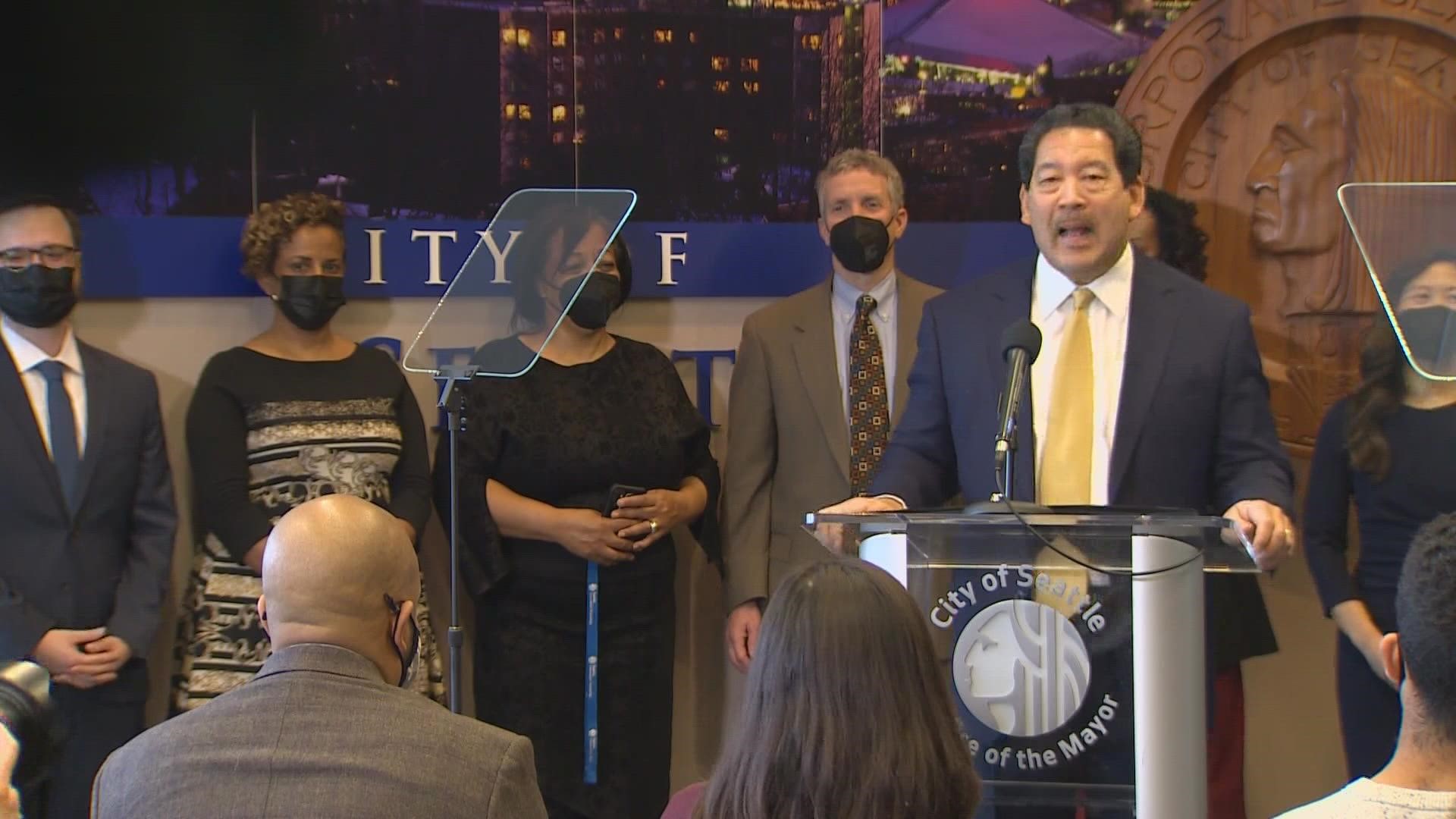SEATTLE — Bruce Harrell was ceremonially sworn in as the mayor of Seattle Tuesday morning.
Harrell officially took office on Jan. 1, 2022, tweeting that he was “energized by what we can achieve for Seattle and each other by working together and leading with our shared values.”
Harrell forwent a large public inauguration due to rising COVID-19 cases. Instead, he was joined by members of his executive team and delivered an address to Seattleites “about his vision for a united city.”
“Under the Harrell administration, Seattle will be thriving,” said Harrell. “We will end the talk of a ‘dying’ city. We will be a city of renewed optimism, a city that treats all with dignity, and appreciates the richness and diverse voices and perspective of our communities and people.”
During his address, Harrell outlined policy goals and promised to tackle issues including health care, the COVID-19 pandemic, police reform and homelessness to unite the city around a “one Seattle vision.”
One of the goals Harrell addressed is having health care for all. Harrell said his administration has already begun to have discussions with health care facilities and civic leaders to make sure “every resident in our city not only has health care but is healthy,” adding that his goal is to ensure Seattle has the healthiest population in the nation.
Harrell also discussed a plan to clean up city parks and not allow people to suffer on Seattle streets and sidewalks, saying his office will publish a homelessness response plan during his first quarter in office.
Harrell also said he would issue at least two executive orders concerning the homelessness crisis and affordable housing.
One executive order would require a transparent plan and direct public utilities to provide the city information on utility shut-offs, which Harrell said is often an indicator of human service needs or homelessness vulnerability.
The second executive order relating to affordable housing would provide a full review of the permitting and approval process. Harrell said affordable housing construction needs to be expedited, and gaps need to be filled where zoning is already available.
Harrell also highlighted his focus on public safety during this inaugural address.
“A safe and supported city employs the right kind and right number of police officers and establishes unarmed, community-based responders we desperately need to restore trust and street-level safety,” said Harrell.
He said he could be working with safety and justice leaders, along with gun violence prevention leaders to redefine what policing looks like in Seattle. He asked all Seattle officers to help him build trust with residents and provide “a beacon of hope and healing for the nation.”
“Seattle is a unique and truly great city, but one Seattle doesn’t mean ‘Seattle is number one,’” said Harrell. “Our place, our pride, our greatness, is not contingent upon the subordinate position of others. It is measured by the examples we set and how we lift ourselves and others.”
Harrell campaigned on a slate of issues, including economic recovery, addressing the housing crisis, enhancing public safety and police reform.
During his campaign, Harrell promised police reform and also police funding while setting a goal of getting 911 response times down to 7 minutes.
Harrell also pledged to spend at least 12% of the city of Seattle’s budget on housing issues. He called homelessness a crisis and said in September that he thought there should be consequences for people living in unsanctioned homeless encampments who refuse services.
Harrell also said he would identify 1,000 units of emergency supportive shelter in his first six months in office and another 1,000 units by the end of the year.
This is technically Harrell’s second time serving as Seattle mayor. He was briefly sworn into office for five days in 2017 after former mayor Ed Murray resigned in a sex abuse scandal. At the time, Harrell, who represented District 2 in south Seattle, decided not to run for re-election so he could keep his seat on Seattle City Council.
Harrell served three terms on Seattle City Council, including as president for three years at the end of his time on the council.
Harrell replaced Jenny Durkan as mayor after she decided not to seek re-election.
The mayor of Seattle is responsible for ensuring the laws of the city are enforced while directing and controlling city government.
Debra Juarez elected council president
On Tuesday, Debora Juarez was elected council president. She will serve through 2023.
Juarez is the first Indigenous council president in Seattle history.
Juarez was first elected to represent District 5 in 2015.
She has worked as a public defender, attorney and judge. She served two state governors, Mike Lowery and Gary Locke, as executive director of the Governor's Office of Indian Affairs.
2022 marks 35 years in public service for Juarez.
The council president serves as the presiding officer of the council, sets the agenda, assigns legislation to committees and is the primary contact for external agencies. The president also assumes the duties of the executive, if the mayor is absent or incapacitated.
“It’s time for our city to heal and move forward to address our most pressing issues: restructuring our community safety system, restoring our public spaces, providing services to those experiencing homelessness, building affordable housing, and working with tribal governments to promote economic vitality,” Juarez said in a prepared statement. “We do this by refocusing our city on what government does well - a common-sense approach, working in tandem with the Mayor, that will restore trust and confidence in our government.”

